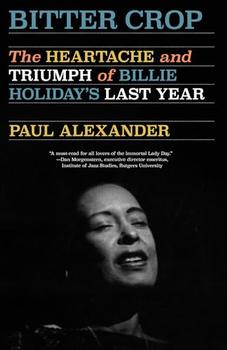Summary | Excerpt | Reviews | Beyond the Book | Read-Alikes | Genres & Themes | Author Bio

The Heartache and Triumph of Billie Holiday's Last Year
by Paul AlexanderThis article relates to Bitter Crop
In February 1959, Billie Holiday sang the anti-lynching song she popularized, "Strange Fruit," on the London television show Chelsea at Nine. She was battling liver disease because of a prodigious vodka and gin addiction. It was rare for Billie to sing "Strange Fruit" when she was this physically fragile.
"She just needed a reason to sing it," notes journalist Paul Alexander, author of Bitter Crop: The Heartache and Triumph of Billie Holiday's Last Year.
As Billie was known to do, she exaggerated the facts that night, telling the London audience it was a song written just for her. It wasn't.
"Strange Fruit" began as a poem titled "Bitter Fruit." It was written by a Russian Jew named Abel Meeropol, a Harvard University alum who taught high-school English in the Bronx. Meeropol was a member of the Communist Party beginning in 1932 and a writer whose pen name was Lewis Allan, taken from the names of his stillborn children. Like many communists, Meeropol believed strongly in racial equality. One day, as he was perusing a civil rights magazine, he came across a photograph of a lynching party that made him sick to his stomach. Lynching, the people who were responsible for its entrenchment, and those who profited from it centered his rage.
The photograph was taken in Marion, Indiana by a man named Lawrence Beitler. Hanging from trees were two innocent black teenagers, Thomas Shipp and Abram Smith, who had been accused of raping a white woman. Meeropol was emotionally overwrought after seeing the photograph and began writing. The poem "Bitter Fruit" was published in a teaching journal, and later he decided to turn it into a song that was then sung at leftist meetings, often by Meeropol's wife Anne. A black woman named Laura Duncan sang it in 1938 at Madison Square Garden. But Meeropol wanted a larger audience. He knew the owner of the Greenwich Village jazz club Café Society and trusted him.
The lyrics are haunting: Southern trees bear a strange fruit/Blood on the leaves and blood at the root/Black body swinging in the Southern breeze/Strange fruit hanging from the poplar trees/Pastoral scene of the gallant South/The bulging eyes and the twisted mouth/Scent of magnolia sweet and fresh/And the sudden smell of burning flesh.
Right before Billie sang "Strange Fruit" for the first time, everything in Café Society quieted to a hush. The waiters and busboys were noiseless figures along the wall. The lightless room with only her face drowning in a pearly light was oddly melodramatic but appropriate considering the lyrics. Billie sang the song with her eyes closed, as if visited by the lynched, as if they were her father and brother. By the end, tears were streaming from eye to chin. When she finished, according to biographer David Margolick, "the lights went out, she was to walk off the stage, and no matter how thunderous the ovation, she was never to return for a bow."
She wanted to record the song. Her record company, Columbia Records, refused but allowed her to record it elsewhere as a compromise. After its release, the black newspaper The New York Age wrote that "Strange Fruit" was "believed to be the first phonograph recording in America of a popular song that has lynching as its theme." Time magazine said it was "a prime piece of musical propaganda" with "grim and gripping lyrics." Many consider "Strange Fruit" the symbolic start to the civil rights movement.
Although radio stations refused to play "Strange Fruit," it sold ten thousand copies its first week of release and reached number 16 on the popular charts.
Twenty years later on Chelsea at Nine, there Billie Holiday was in a sparkly gray dress and high-heeled shoes. She sang "Strange Fruit" impressively considering her illness. Her voice was mournful and vibrant and at the song's end — here is a strange and bitter crop — she was frozen in place as the applause echoed in her ears. She had leaned into the lyrics as if telling a painful story about her own sad life and her narration was stirring. As the audience cheered, she may have had no inkling of sand running through the hourglass. Time was fleeting. This would be the last time Lady Day was seen on television, After the performance, she went to a party to celebrate her appearance and later left London in a pleasant mood. Three months later, the famous Billie Holiday would be dead.
But "Strange Fruit" was for the ages. Time magazine, who had once labeled the song propaganda, in 1999 called it the "song of the century."
Filed under Music and the Arts
![]() This "beyond the book article" relates to Bitter Crop. It originally ran in April 2024 and has been updated for the
March 2025 paperback edition.
Go to magazine.
This "beyond the book article" relates to Bitter Crop. It originally ran in April 2024 and has been updated for the
March 2025 paperback edition.
Go to magazine.
Your guide toexceptional books
BookBrowse seeks out and recommends the best in contemporary fiction and nonfiction—books that not only engage and entertain but also deepen our understanding of ourselves and the world around us.